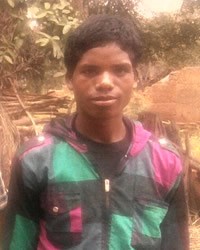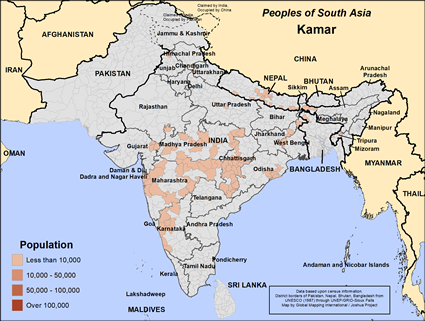Kamar in India

Photo Source:
Anonymous
|

Map Source:
People Group data: Omid. Map geography: UNESCO / GMI. Map Design: Joshua Project.
|
| People Name: | Kamar |
| Country: | India |
| 10/40 Window: | Yes |
| Population: | 29,000 |
| World Population: | 30,700 |
| Primary Language: | Kamar |
| Primary Religion: | Hinduism |
| Christian Adherents: | 0.04 % |
| Evangelicals: | 0.00 % |
| Scripture: | Portions |
| Ministry Resources: | No |
| Jesus Film: | No |
| Audio Recordings: | No |
| People Cluster: | South Asia Tribal - other |
| Affinity Bloc: | South Asian Peoples |
| Progress Level: |
|
Introduction / History
The Kamar people traditionally were either blacksmiths or foot soldiers. They would forge iron farm tools, sell them and repair them. The Kamar people are among what the Indian government calls the "scheduled tribes. " Because scheduled tribes are underdeveloped economically, the Indian government has attempted to bring them into the mainstream of political and economic life. The tribes were "scheduled" for special treatment and privileges.
What Are Their Lives Like?
Most of the Kamar earn their income by making bamboo items, which they sell and trade in the weekly markets. Many engage in basketry throughout the entire year, and they are well known for this skill. Their fine bamboo baskets can be traded for goods such as rice, tea and liquor. Farming is the secondary occupation of the Kamar, followed closely by hunting and fishing. Recently, many Kamar have become workers in large scale industries near their homes. They may supplement their incomes by collecting forest products, especially certain types of leaves, which they sell to contractors. The women do much of the strenuous work in the fields and forests. Many of the smaller Kamar villages consist of settled farmers, but all Kamar believe that it was their destiny to practice the slash and burn method of agriculture. Even those who work on permanent plots burn off the land and practice crop rotation. The fields are worked with pick axes and spades, and they use iron sickles to harvest their crops. The Kamar are dispersed in villages, which are generally mixed with other tribal communities. The settlements consist of scattered huts with no definite pattern. They locate their larger villages near the foothills or deep in the forests, and the smaller settlements are along roadsides. The Kamar typically live in two-room mud huts. One of the rooms is for storage and for the household god. Their houses are very neat and clean. They keep various kinds of fishing traps in their homes since they love to fish. Many have a shed for socializing. Most houses also have a bari, or small vegetable garden, which is an important factor in their survival. The Kamar tribe is divided into several clans, or gots. The gots are endogamous, meaning they only marry within their own clan. They prefer cross cousin marriages, and males initiate the marriage negotiations.
What Are Their Beliefs?
The Kamar are ethnic religionists who have been heavily influenced by Hinduism. Each home has a family god in the form of iron chains decorated with peacock feathers. The Pujari (priest) offers goat sacrifices to the local gods and deities on ceremonial occasions. The villagers believe that punishments for evil behavior such as incest, are carried out supernaturally by the gods.
What Are Their Needs?
Like other scheduled tribes in India, the Kamars need to put their identity in Jesus Christ. They need to find their worth in being part of God's family, not in the status that others give them.
Prayer Points
Pray for gospel workers to catch a vision for reaching the Kamar people for Jesus and that in God's sovereign timing their hearts would be open and ready to follow him. Pray for Jesus movements to bless extended families so the gospel will spread rapidly among this people group. Pray for the lives and culture of the Kamar people to evidence the rule and reign of the Kingdom of God as they open to the gospel, and for the beauty of Jesus to be seen in them. Pray for the spiritual lives of the Kamar people to become fruitful as they follow Christ.